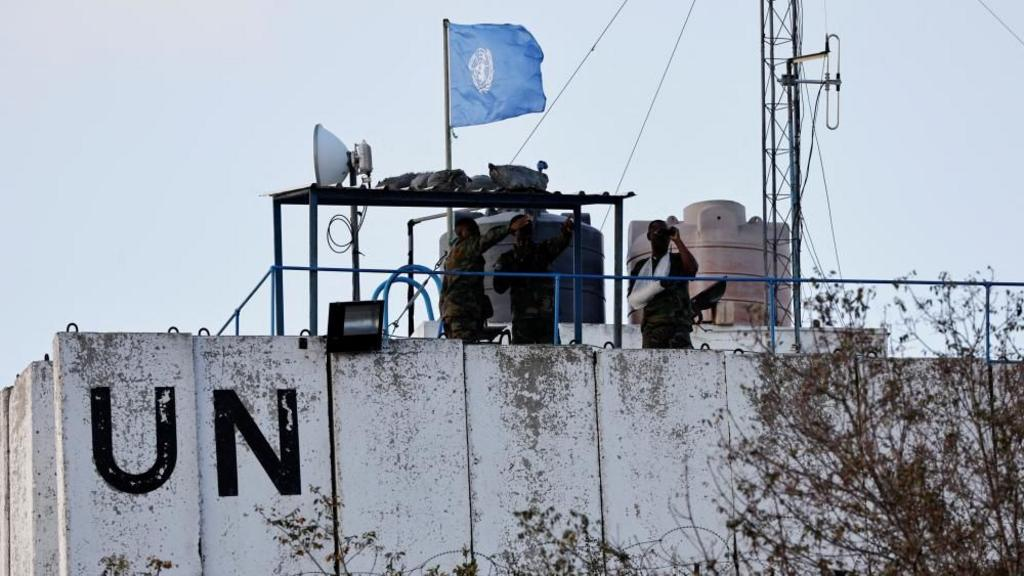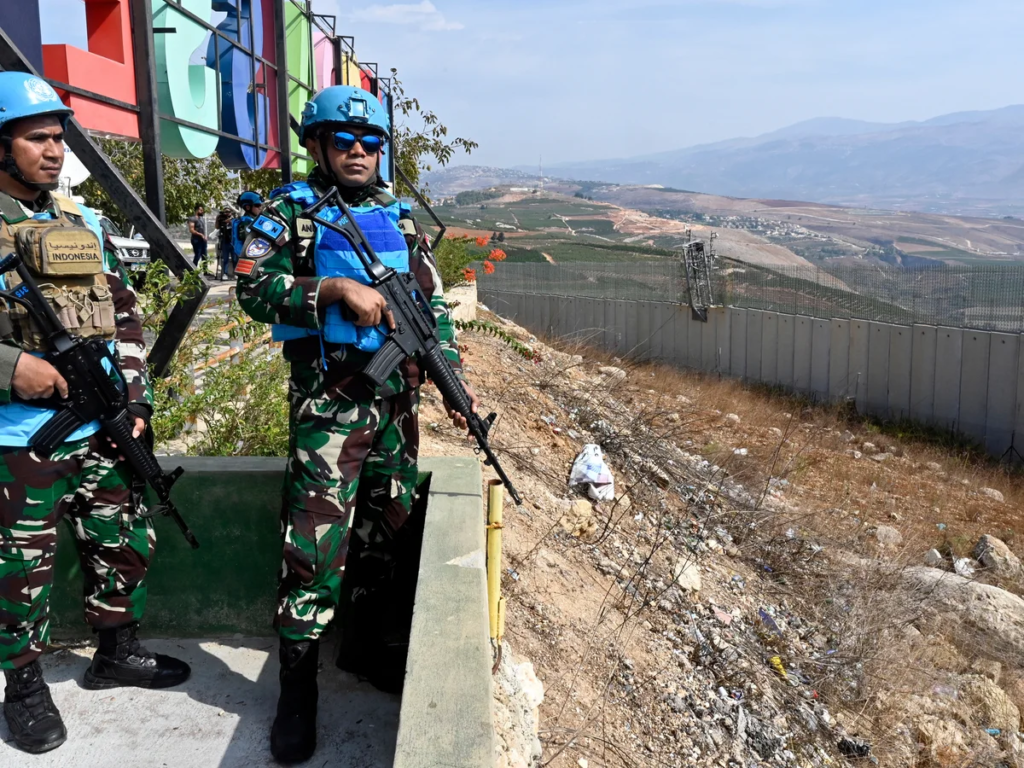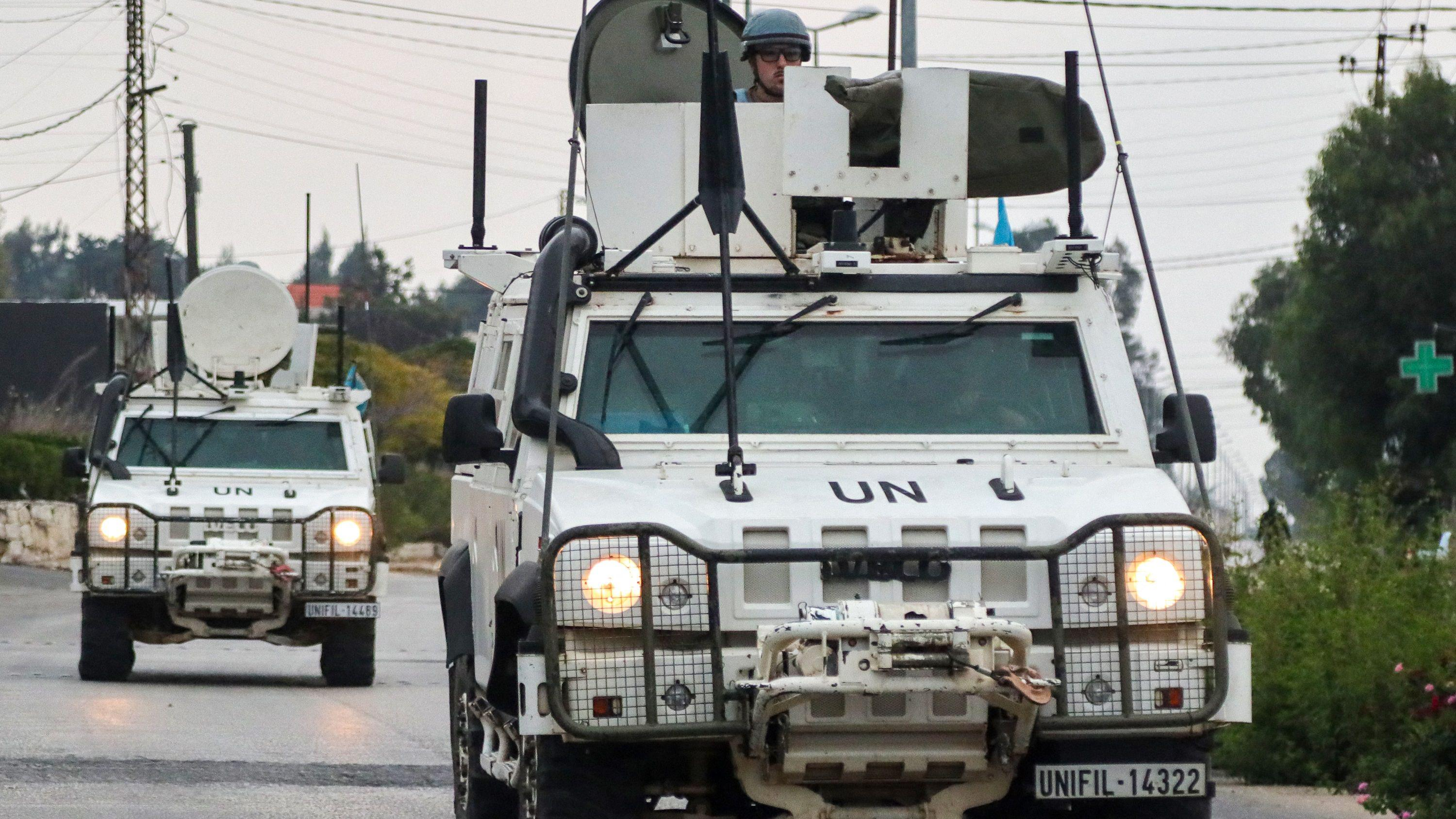The ongoing conflict between Israel and Hezbollah in southern Lebanon has not only escalated tensions between the two opposing forces but has also drawn in international actors, including the United Nations peacekeeping mission (UNIFIL).
In recent days, multiple incidents have been reported in which UN peacekeepers were caught in the crossfire of the ongoing battles, leaving several of them injured. One such incident occurred on Friday, when Israeli Defense Forces (IDF) fired near a UN watchtower, resulting in two Sri Lankan peacekeepers being wounded.
This situation raises critical questions about the protection of international personnel in conflict zones, as well as the consequences of military actions taken in such volatile areas.
As fighting intensifies between Israel and Hezbollah, the safety of UNIFIL peacekeepers has become a matter of international concern, with strong reactions from countries like France, Italy, and the United States.
The IDF’s Justification for the Attack
The Israeli Defense Forces have stated that the strike near the UNIFIL watchtower was not a deliberate attack on the peacekeepers themselves but rather a defensive measure in response to an immediate threat posed by Hezbollah militants operating nearby.
According to the IDF, its troops were engaged in combat with Hezbollah fighters when they identified a perceived danger emanating from the area near the UNIFIL post. The Israeli military claims that it had warned the peacekeepers hours earlier to seek shelter to avoid being harmed in the crossfire.
Read : IDF Destroys Hezbollah Tunnel, Shares Video Showing Arms Inside It: Watch
“Soldiers operating in southern Lebanon identified an immediate threat against them. The soldiers responded with fire toward the threat,” the Israeli military said in a statement.
They also expressed “deep concern” over the injuries sustained by the peacekeepers but emphasized that the proximity of the UN position to the Hezbollah forces made it difficult to avoid such incidents.
Read : Discovering Lebanon: Top Ten Selfie Spots for Immersing in History and Beauty
The IDF indicated that its initial examination showed that the UNIFIL post was approximately 50 meters from the source of the threat, making collateral damage almost inevitable in the chaos of battle.
While the IDF insists that the attack was not aimed directly at the peacekeepers, the fact remains that two UN personnel were injured. This has raised questions about the measures in place to ensure the safety of neutral parties, such as UN peacekeepers, during military engagements.
The justification provided by the IDF does little to assuage concerns that the proximity of UN personnel to combat zones might result in more such incidents in the future.
The Response from the International Community
The attack on the UNIFIL peacekeepers has prompted a strong response from the international community. The United Nations itself has expressed grave concerns about the safety of its personnel, with UN Secretary-General Antonio Guterres condemning the attacks on peacekeepers.

The United Nations has been active in southern Lebanon under Security Council Resolution 1701, which called for the cessation of hostilities between Israel and Hezbollah in 2006. UNIFIL’s mandate is to monitor the Blue Line, the boundary between Israel and Lebanon, and to assist the Lebanese government in maintaining peace and security in the region.
France, Italy, and Spain, all of which contribute troops to the UNIFIL mission, have issued a joint statement denouncing the attack on the peacekeepers. France, in particular, summoned Israel’s ambassador to demand explanations for what it called an “unjustifiable” assault.
These countries have emphasized that the security of UN personnel and property must be guaranteed, and that any attacks on peacekeepers represent a serious breach of international law.
US President Joe Biden also weighed in on the situation, urging Israel to exercise caution and avoid targeting UN peacekeepers. This call for restraint from the United States reflects broader concerns about the potential for further escalation in the region.
With Hezbollah continuing to fire rockets into Israel and Israeli forces retaliating with air and ground strikes, the situation remains highly volatile.
Russia, too, has condemned the incident, with Russian officials expressing “outrage” over the attack on UN personnel. Moscow has demanded that Israel refrain from engaging in any further hostile actions against the peacekeepers, highlighting the importance of protecting those tasked with maintaining stability in conflict zones.
The Broader Context of the Conflict
The latest flare-up of violence between Israel and Hezbollah can be traced back to the support Hezbollah has provided to Hamas in the Gaza Strip. Following the October 7 massacre in southern Israel, where Hamas militants killed over 1,200 people and took 251 hostages, Hezbollah launched rocket attacks on northern Israel in a show of solidarity with Hamas.
This has led to a dramatic escalation in hostilities, with both Israel and Hezbollah launching attacks across the Lebanese-Israeli border.

In response to the rocket fire from Hezbollah, Israel has intensified its military operations in southern Lebanon, targeting Hezbollah strongholds in Beirut’s southern suburbs, the Bekaa Valley, and other regions. Israeli ground troops have also crossed into southern Lebanon in an effort to push Hezbollah forces further away from the border.
According to Israeli authorities, the goal of these ground operations is to secure northern Israel and allow the safe return of civilians who were evacuated from the region when the fighting first erupted.
However, the situation has become increasingly complex due to the presence of UNIFIL forces in the area. The peacekeepers are stationed in southern Lebanon to monitor the ceasefire agreement and prevent a resurgence of large-scale conflict between Israel and Hezbollah.
The recent incidents involving the injuries of UN peacekeepers demonstrate the dangers these personnel face as the conflict intensifies. With both Hezbollah and Israeli forces operating in close proximity to UN positions, the risk of further harm to peacekeepers is high.
UNIFIL has issued several statements warning that its personnel are operating in extremely dangerous conditions. On Friday, for instance, the UN reported that several blast walls at one of its positions in Labbouneh were knocked down by Israeli tank movements and a Caterpillar vehicle.
The force emphasized that these incidents represent a serious risk to the safety of peacekeepers who are deployed in southern Lebanon at the request of the United Nations Security Council.
Moreover, the Lebanese government has accused Israel of deliberately targeting UN positions. Lebanon’s foreign ministry stated that the IDF had fired on watchtowers and UNIFIL’s main base in Naqura, as well as on the base housing the Sri Lankan battalion, leading to several injuries.
The Lebanese National News Agency reported that an Israeli Merkava tank had specifically targeted one of the UN watchtowers along the Tyre-Naqura road.
The Dangers of Escalating Conflict
As the conflict between Israel and Hezbollah continues to escalate, the risks to UN peacekeepers and civilians in southern Lebanon increase significantly.
The injuries to the Sri Lankan peacekeepers on Friday, combined with the earlier incident in which two Indonesian peacekeepers were hurt after falling from a watchtower struck by Israeli tank fire, highlight the precarious situation facing those stationed in the region.

UNIFIL’s role as a neutral peacekeeping force is becoming increasingly difficult to maintain, particularly as both Hezbollah and Israeli forces operate in close proximity to UN positions. The risk of further incidents involving peacekeepers, either as unintended casualties or deliberate targets, is growing.
The broader implications of these incidents are also significant. Attacks on UN personnel are considered serious violations of international law, and any further harm to peacekeepers could have severe diplomatic consequences for Israel.
The international community, especially countries contributing troops to the UNIFIL mission, will be closely monitoring the situation and may call for more robust measures to ensure the safety of their personnel.
In conclusion, the recent attacks on UN peacekeepers in southern Lebanon underscore the dangers posed by the ongoing conflict between Israel and Hezbollah.
While the IDF has maintained that the injuries to the peacekeepers were the result of defensive actions against Hezbollah fighters, the international community has expressed outrage and concern over the incidents.
As the fighting continues, the safety of UNIFIL personnel remains a pressing issue, and the potential for further escalation looms large.

